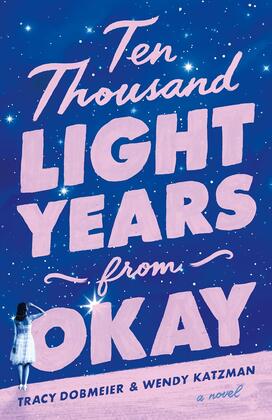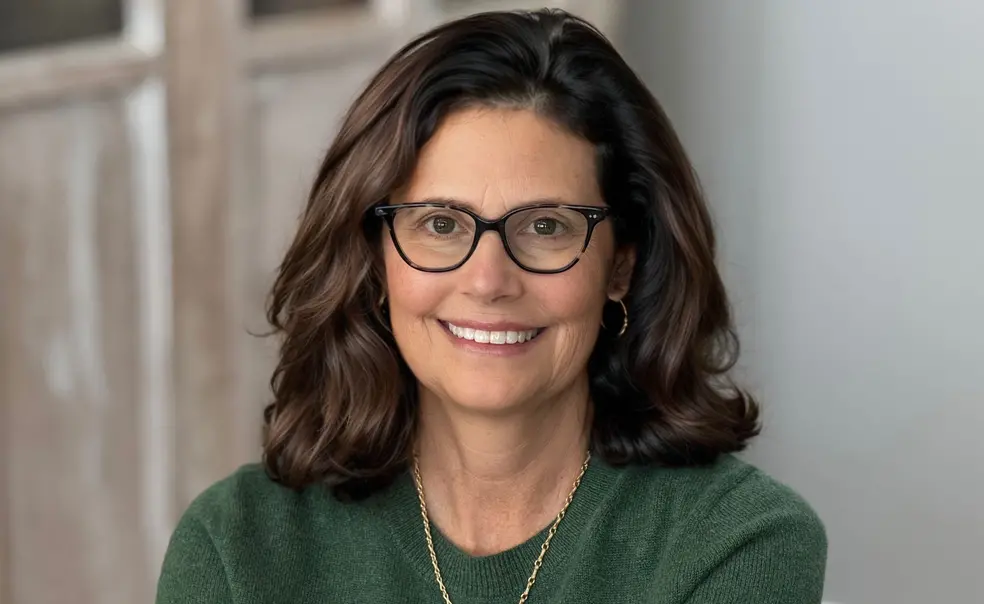Tracy Dobmeier ’90 Collaborates on Novel that Blurs the Lines of Reality and Fiction
The book: Thea, a grieving young novelist, believes she is cursed. The words she writes seem to come true — or was it just an awful coincidence that her husband’s tragic death mirrored the plotline of her novel? Thea nearly decides to give up on writing but finds inspiration to write a new tale: A romance centered around an astronaut who finally returns home. Thea’s reality is turned on its head again when she meets a charismatic astronaut in real life. In Ten Thousand Light Years from Okay (Lake Union) Thea must unravel fantasy vs. reality by tackling her grief head-on before she completely loses everything.

The authors: Tracy (Friedman) Dobmeier ’90 earned her undergraduate degree from Princeton’s School of Public and International Affairs and a J.D from the University of California, Berkeley. Dobmeier lives in Seattle with her husband, Eric Dobmeier ’90, where she's been writing novels for the past several years with her longtime friend, Wendy Katzman. The duo's debut novel, Girls with Bright Futures, was a suspenseful journey into the cutthroat world of college admissions, which earned starred reviews from Publisher’s Weekly and Library Journal and was named a “Book Club Winner” by Real Simple and an Apple Best Book.
Wendy Katzman was a nationally ranked youth tennis player who played for the University of Michigan, where she earned her undergraduate degree in history. Before moving to writing novels with Dobmeier, Katzman worked for more than two decades in Seattle as a medical marketing executive.
Excerpt:
There were four missed calls from Harper, and now a fifth flashing on my screen. With no upside to putting this off further, I stepped into the bathroom and answered. We exchanged a few minutes of small talk, until I could tell Harper was about to go there. I took a stab at heading it off. “Hey, so I’ve been batting around a few new ideas.”
“That’s great,” Harper said. “Like what?”
“They’re not quite ready,” I demurred.
“When might they be ready?” she pressed.
“I’m not sure,” I said. “Soon-ish?”
“Thea, what are you, thirty?” Harper asked.
“No, actually, I’m not even twenty-nine and a half yet.” I winced, instantly regretting how childish I sounded. Next I’d be blurting out the date of my half birthday and pleading for a bouncy castle.
Harper paused, as if to demonstrate that sometimes no words were better than dumb ones. “For the sake of discussion, let’s agree you’re coming up on thirty. You published one terrific book about four years ago. Given your relative youth, you probably feel like you have nothing but time. But it’s my job to tell you that in order to stay relevant in this industry, you need to publish a book more than once a decade.”
Oof. “I know, Harper. I get that. I do. I’m trying. But the grief is all still pretty raw, you know?” Which was true, but it was also a naked play for sympathy. And more time.
“That’s the beauty of your situation,” Harper said. “You don’t have to write another manuscript right now. Or even this year. You can continue healing. You know why?”
I braced for the answer to her obviously rhetorical question.
“Because the publisher is still interested in Call of the Void.”
“I’m sorry, but no,” I said emphatically. “I need you to understand that they could literally offer me the sun and the moon for that story and the answer would still be no — a thousand times no — every single time.”
“Please tell me after all these years you’re not still stuck on that irrational fear.”
“What irrational fear?” I hedged, hoping she’d let it drop.
“The one where you believe your books have the power to create their own reality?” Harper sounded uncharacteristically annoyed.
“Harper, I get that you’re frustrated that I won’t sell Call of the Void and that my reasoning doesn’t seem rational to you. But I need you to remember that Call of the Void is about a child who gets kidnapped and disappears forever. Even if there’s just an infinitesimal chance that my last book played a role in Sam’s death, I couldn’t possibly risk putting out a story into the universe that might invite tragedy back into our lives. Lucy’s all I have. I wouldn’t survive it if something happened to her,” I squeaked out. “It would forever feel like it was my fault. Like, I don’t know, what if you were a PhD and you spent five years in a lab researching a rare pediatric brain cancer, and then your child was diagnosed with the same cancer? Wouldn’t you have questions? Or blame yourself, even if ninety-nine percent of the time you knew it wasn’t your fault?”
Harper sighed in answer. “I don’t know, maybe, unless the research I was doing helped find a cure.”
“Good point,” I acknowledged.
“But the problem is, I’m not a brain cancer researcher, I’m a literary agent. It’s my job to get compelling books published for people to read.” She hesitated for a moment. “So let’s suppose we set that manuscript aside for good. What then?”
“I’m not sure,” I said honestly. “Believe me. I want to write again more than anything, and I’m actively trying, but I need more time to settle on a concept that feels controllable.”
“Oh, Thea,” she lamented. “You used to be so energetic and bold. You were determined to write an entire shelf’s worth of books. You had a big career planned, and I was so there for it. I want you to understand that I haven’t taken my commitment to be your career partner lightly. I adore working with you. But unless you produce another manuscript that you will let me sell, then I’m having trouble seeing how it’s in either of our interests to prolong this relationship. I need to focus on my authors who are burning to publish, not tripping over reasons to avoid it. So how about if we set a deadline by which you either give me permission to sell Call of the Void or you submit a new book proposal?”
“A deadline? A proposal?” I repeated numbly as the words echoed through me. “Wait, are you saying you’ll dump me as a client?”
“That’s up to you,” Harper said.
“Lucy starts kindergarten in less than two years. Maybe that can be the deadline?” I could work with that.
Harper cleared her throat. “I was thinking more like next Friday.”
“Next Friday?” My insides twisted. “But that’s, like, really, really soon.”
“You’ve had years. Time’s up,” Harper said. “Listen, I have to run, but I’ll call you again next Friday. And for the record, I still believe in you. This shouldn’t be how your story ends.”
So much for nothing but time.
Excerpted from Ten Thousand Light Years from Okay by Tracy Dobmeier and Wendy Katzman. © 2025. Printed with permission of the publisher Lake Union.
Reviews:
“Ten Thousand Light Years from Okay is just the book we need right now. Sure, it’s brimming with hope and love and family…but more than that it’s a book that celebrates coincidences and magical thinking, with plot twists that keep you turning pages and rooting for the heroine, a young widowed mom who is determined to write herself a happy love story after the death of her husband. It has everything I love in a book: laughter and magic and tears on every page.” — Maddie Dawson, bestselling author of Matchmaking for Beginners
“In this intriguing exploration of how grief can alter our perceptions, Dobmeier and Katzman lift the veil on the inner life of a struggling writer. Full of surprises that keep the pages turning, this is an immersive tale about a heartbroken woman who strives to balance restarting her writing career with being present for her young daughter — and maybe trusting love again. Ten Thousand Light Years From Okay is an uplifting journey of second chances, and a testament to the healing power of understanding and forgiveness, especially for oneself.” — Glendy Vanderah, bestselling author of Where the Forest Meets the Stars












No responses yet